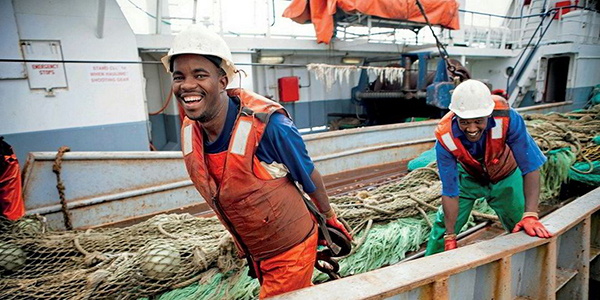Albertina Nakale
Fisheries minister Derek Klazen clarified that labour unions are not party to the section 4 agreement of the Marine Resources Act. This is because the agreement binds the contracting parties, and there are no additional or new conditions under which the unions can be legally bound without contradicting existing labour laws.
“As a matter of good practice, any agreement between the union is best entered with the employer regarding especially bargaining power, wage negotiations and dispute resolutions,” Klazen recently remarked in the National Assembly
He was providing clarity on the report of the select committee of the National Assembly on the mass resignation of fishermen employed under the governmental employment redressing programme in Walvis Bay during 2022.
In 2020, the ministry ran an open public bid, calling on experienced and competent fishing companies to re-employ fishermen who lost their jobs as a result of the NamSov retrenchments and those who took part in an ill-fated industrial strike
Following the adjudication process in 2020, the then-fisheries minister Albert Kawana submitted to Cabinet for consideration and approval of a Governmental Employment Redressing Programme in terms of sections 3(3) and 4 of the Marine Resources Act 2000 (Act 27 of 2000) as amended, and requested Cabinet to designate the successful companies.
As a result, various companies became designated entities, and an agreement for the re-employment of fishermen was entered into and gazetted by Government Gazette Notice No 74 on the 24th of July 2020.
Various aspects were raised in the report, particularly by labour unions over the agreement, as they feel excluded in the process.
In the report, the Namibia Fishing Industries and Fishermen Workers’ Union alleges they were sidelined by the fisheries ministry during the negotiations for the employment of the fishermen and the signing of the agreements.
Klazen denied the allegations, saying extensive consultations were held with all recognised labour unions during the negotiations to re-employing the fishermen.
“I do, however, concede to the fact that the unions are not a party to these agreements because the agreements are between the Ministry of Fisheries and Marine Resources with the Ministry of Labour, Industrial Relations and Employment Creation on one hand and the designated entities on another – and it contains key deliverables, duties and binding contractual terms,” he explained.
Further, the same union speaks of Walu Fishing Investments Pty (Ltd) being willing and able to employ the affected fishermen and having made a presentation to the fisheries ministry.
Klazen explained Walu Fishing Investments Pty (Ltd) made a presentation to the ministry after the workers tendered their resignation with the designated entities, whose designation was for the entire season.
Hence, he noted designation of entities by Cabinet would only take place after a public request for proposals and after a fishing company is awarded participation in the Governmental Employment Redress Programme.
“Simply put, it is not simply a matter of making a presentation to the ministry but the procuring of the services of companies in an open and transparent manner consistent with our laws,” the minister said.
Therefore, he said, the ministry cannot consider the proposal by Walu Fishing Investment Pty (Ltd) because it is not a fishing right-holder, nor is it a designated entity.
– anakale@nepc.com.na



